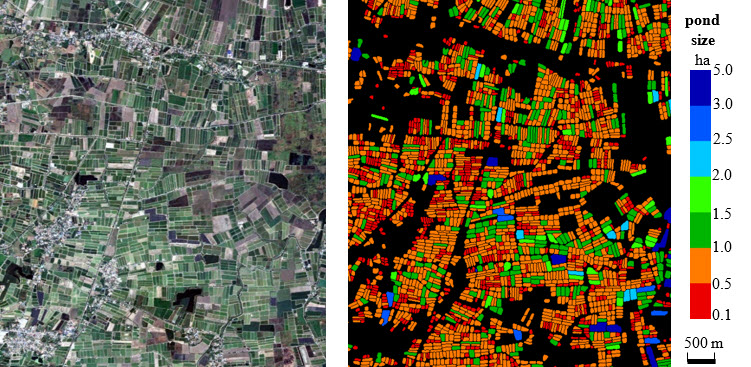MSU Researchers to Study Asian Aquaculture with New NASA Grant
November 28, 2022 - Diane Huhn

A satellite image over a 6 × 7 km region in central Thailand and the corresponding automatically extracted aquaculture ponds each colored by their area. Image courtesy of Lin Yan.
With new funding secured through a nearly $800,000 grant from the NASA Land Cover/Land Use Change (LCLUC) program, researchers from Michigan State University will be working to assess aquaculture in Bangladesh, India, Myanmar, and Thailand. Using satellite imagery and survey information, Drs. Lin Yan, Ben Belton, and David Roy will analyze how the industry is driving land cover and land use change in aquaculture hot spots.
"Aquaculture contributes substantially to global food and nutrition security and is projected to expand further in response to demand from an increasingly populous, affluent, and urbanizing world. When implemented sustainably, aquaculture can contribute substantially to addressing the challenges of global food and nutrition security. Yet, for many years, poor practices have often led to significant environmental damage in areas where it is employed," said Dr. Yan, assistant professor with the Center for Global Change and Earth Observations (CGCEO) at MSU.
"Approximately 80% of global aquaculture production is currently taking place in Asia. Yet, it's long been assumed that much of Asian aquaculture has been implemented on a small scale. However, the size and tenure of aquaculture farms have been poorly documented. The factors that drive and mediate aquaculture change have been understudied in the past, and there are few sources of publicly available data on the boundaries of aquaculture "ponds", commented Dr. Ben Belton Ben, associate professor with the MSU Department of Agricultural, Food, and Resource Economics.
"This research is of great academic interest but also has practical implications for policies affecting land use and aquaculture in key global aquaculture hot spots," said Dr. Roy, professor of Geography and the Interim Director of the CGCEO.
Work on the 3-year grant will commence in early 2023. Focal areas for the team will include the Ayeyarwady Delta in Myanmar, Southwestern and Northern parts of Bangladesh, the Central Plains around Bangkok in Thailand, and the Andhra Pradesh Province of India.
Dr. Belton is a rural sociologist specializing in Asian aquaculture. Currently based in Malaysia, he has conducted aquacultural surveys across Asia. Combining the survey data with high-resolution satellite imagery, the team will work to characterize the use of aquaculture in these regions by type and scale and explore hypotheses to understand the drivers and constraints of aquacultural change.
"This work is an important part of the Center's mission to use the latest geospatial technologies to improve human and societal well-being while supporting global efforts to increase the use of sustainable aquaculture and lessen its potential negative impacts on the environment," said Dr. Roy. Click here to learn more the NASA Land-Cover and Land-Use Change Program.

